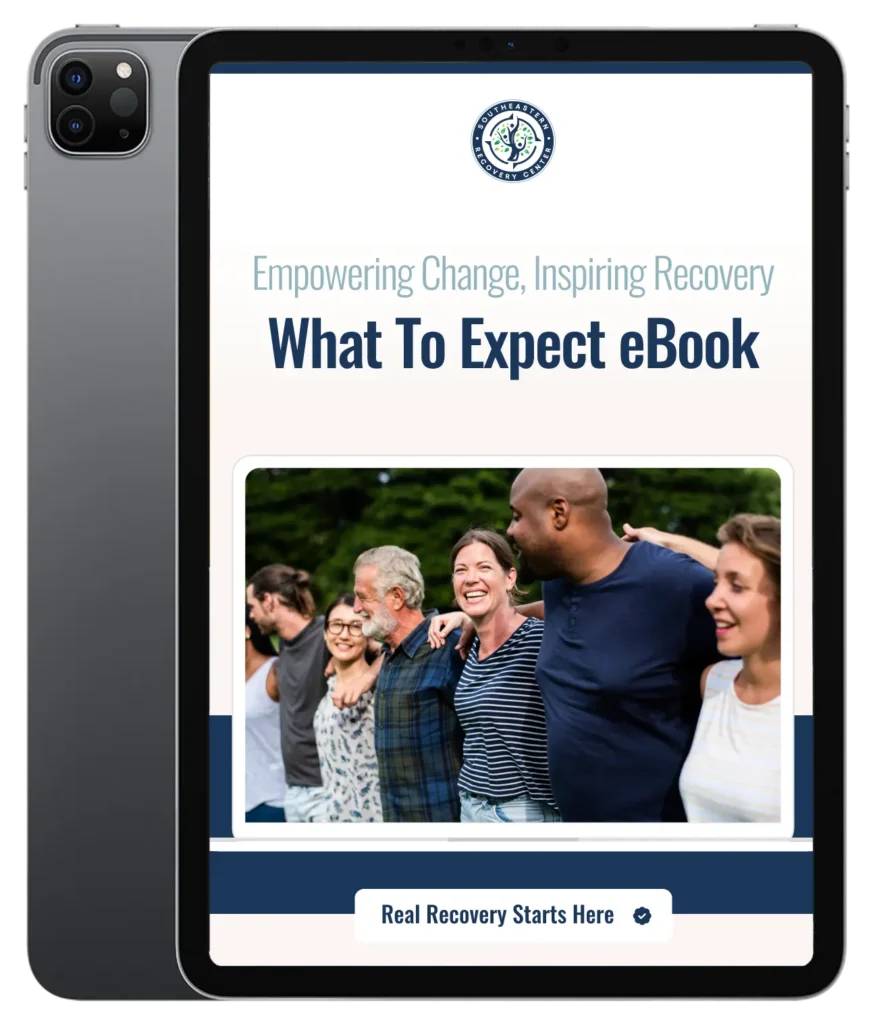What to look for when selecting intensive outpatient rehab – Charlotte, NC. If you need help with drug and alcohol addiction – call (704) 248-8561.

At Southeastern Recovery Center in Charlotte, NC, our Intensive Outpatient Program (IOP) provides clients with structured treatment for substance use while allowing them to live at home, attend school, maintain work and family responsibilities, and continue with their daily routines. Many clients in the Charlotte area transition to our IOP program after completing a higher level of care, such as our Partial Hospitalization Program (PHP).

An outpatient alcohol rehab program in Charlotte is a type of treatment program designed to help individuals recover from alcohol addiction while allowing them to continue living at home and attending work, school, or other responsibilities. Unlike inpatient programs, where individuals stay at a treatment facility for an extended period, outpatient programs offer more flexibility in terms of scheduling and location.
Another outpatient option is an Intensive Outpatient Program (IOP). This is a structured treatment program designed to address substance abuse and addiction issues while allowing individuals to maintain their daily routines and responsibilities to some extent. IOPs offer more intensive and comprehensive treatment compared to traditional outpatient programs but are less restrictive than residential or inpatient treatment settings.
Everyone's journey to recovery is unique, and there’s no one-size-fits-all solution to treating addiction. At Southeastern Recovery Center in Charlotte, we understand that some clients may benefit from the immersive environment of inpatient treatment, while others may thrive in an Intensive Outpatient Program (IOP).
Our Charlotte-based IOP program offers the structured therapy and support of residential care but provides the flexibility to maintain daily responsibilities, such as work, school, or family commitments. This balanced approach makes our IOP an ideal option for those seeking comprehensive treatment without disrupting their lives in the Queen City.

Reach Out For Help
If you or a loved one are struggling with substance abuse, please reach out to our team now.
We are available 24/7 to take your call.
Create A Treatment Plan
Our team understands each individual has a unique story which led them to seek help.
We will create an individualized treatment plan specific to the individual.
Begin Your Journey To Sobriety
Your recovery story begins as soon as you arrive at our facility.
Our experienced & compassionate team will be with you every step of the way!
Drug and alcohol addiction, also known as substance use disorder (SUD), can have various causes and signs. The purpose of outpatient programs and IOP rehab is for Charlotte residents to get the help they need to lead a sober life. Understanding the causes and the signs of addiction can help family members, individuals, and friends help get help to those who need it the most.
Causes of Drug and Alcohol Addiction
Genetics and Family History:
Individuals with a family history of addiction are at a higher risk of developing substance use disorders. Genetic factors can predispose individuals to addiction.
Environmental Factors:
Exposure to environments where substance abuse is prevalent, such as within the family, peer groups, or community, can increase the likelihood of developing addiction. Stressful life circumstances, trauma, and adverse childhood experiences can also contribute
Mental Health Disorders:
Co-occurring mental health disorders such as depression, anxiety, bipolar disorder, or post-traumatic stress disorder (PTSD) can increase vulnerability to addiction. Individuals may use substances as a way to self-medicate and alleviate symptoms.
Neurobiological Factors:
Substance abuse can lead to changes in the brain’s reward system, affecting neurotransmitter pathways associated with pleasure and reinforcement. Continued substance use can lead to tolerance, dependence, and addiction.
Peer Influence:
Social factors, including peer pressure and social acceptance of substance use, can influence an individual’s decision to experiment with drugs or alcohol and continue using them.
Early Exposure:
Early initiation of drug or alcohol use, particularly during adolescence when the brain is still developing, can increase the risk of addiction later in life.
Availability and Accessibility:
Easy access to drugs or alcohol, whether through social networks, family, or environmental factors, can contribute to the development of addiction.
Trauma and Stress:
Experiencing trauma, stress, or significant life changes can increase susceptibility to substance abuse as individuals may turn to substances as a coping mechanism.
Signs of Drug and Alcohol Addiction
Loss of Control:
Individuals may find themselves unable to control their drug or alcohol use despite negative consequences, such as health problems, legal issues, or relationship conflicts
Cravings:
Strong urges or cravings to use drugs or alcohol, often leading to compulsive behavior and preoccupation with obtaining and using substances.
Tolerance:
The need to consume increasing amounts of drugs or alcohol to achieve the desired effects, indicating a tolerance buildup.
Withdrawal Symptoms:
Physical or psychological symptoms experienced when attempting to cut down or stop drug or alcohol use, including nausea, tremors, anxiety, irritability, and sweating.
Neglect of Responsibilities:
Prioritizing drug or alcohol use over obligations such as work, school, or family responsibilities, leading to neglect of important duties.
Continued Use Despite Consequences:
Persisting in drug or alcohol use despite experiencing negative consequences, such as legal problems, financial difficulties, or deteriorating health.
Changes in Behavior:
Individuals may exhibit changes in behavior, mood swings, secrecy, or deception related to their substance use, including lying about their drug or alcohol consumption.
Isolation:
Withdrawing from social activities, hobbies, or relationships in favor of spending time alone or with others who also use drugs or alcohol.
Financial Issues:
Experiencing financial difficulties due to spending a significant amount of money on drugs or alcohol.
Physical Health Problems:
Development of physical health issues related to drug or alcohol use, such as liver damage, respiratory problems, or infectious diseases.
Psychological Symptoms:
Symptoms of depression, anxiety, paranoia, or psychosis may accompany substance abuse, particularly with prolonged and heavy use.

At Southeastern Recovery Center, we understand that the ultimate goal is long term sobriety which is why our program focuses on providing evidence-based treatment. Some characterisitics of our program include:


If you or a loved one are interested in learning more about what to expect when getting help for drug or alcohol addiction, please fill out our brief form and download the eBook. You can also give our admissions team a call & we would be happy to answer any questions you may have. Help is only a call away!

In Charlotte, North Carolina, seeking a diagnosis for drug and alcohol addiction typically involves several steps. When someone suspects they may have a problem, they may conduct a self-assessment, reflecting on their substance use habits and the impact on various aspects of their lives.
Next, scheduling an appointment with a primary care physician allows for a thorough evaluation of physical health and a discussion of substance use history, potentially leading to referrals to addiction specialists or treatment facilities. These specialists perform comprehensive assessments, utilizing screening tools and diagnostic criteria to determine the presence of a substance use disorder.
At an outpatient or IOP rehab center in Charlotte, individuals can expect a structured and supportive environment aimed at addressing substance use disorders while allowing them to maintain their daily routines. Here's what to expect at such a facility:

One of the biggest concerns individuals have when seeking outpatient or IOP rehab in Charlotte is how they are going to pay for it. Luckily, many private insurance and government insurance (Medicaid, etc.) agencies offer coverage for drug and alcohol addiction treatment. If insurance does not cover it completely, there may be options for sliding fee payments or self-payment options. Discussing your options with the outpatient or IOP rehab center is the first step to uncovering what payment options are available for treatment.
Outpatient rehab typically involves attending therapy sessions and treatment appointments on a part-time basis while living at home. In contrast, IOP rehab offers a more intensive level of care, with participants attending treatment sessions several times a week for several hours each day but still living at home.
Individuals with mild to moderate substance use disorders, a stable living environment, and a supportive network at home may be good candidates for outpatient or IOP rehab. These programs are suitable for those who do not require 24-hour supervision or medical detoxification.
Many insurance plans, including private health insurance and Medicaid, offer coverage for alcohol rehab in Charlotte. It's essential to verify coverage details with the insurance provider and the chosen rehab facility.
The duration of outpatient and IOP rehab programs varies depending on individual needs, treatment goals, and progress in recovery. Some programs may last for several weeks, while others may extend for several months.
Yes, one of the benefits of outpatient and IOP rehab is that individuals can maintain their work, school, or family commitments while receiving treatment. These programs offer flexibility in scheduling treatment sessions to accommodate participants' daily routines.
Many insurance plans provide coverage for outpatient and IOP rehab services, including assessments, therapy sessions, and medication management. It's advisable to check with your insurance provider to determine your coverage and any out-of-pocket expenses.
Relapse is a common part of the recovery process, and outpatient and IOP rehab programs are equipped to address relapse if it occurs. Therapists and counselors work with individuals to identify triggers, develop coping strategies, and adjust the treatment plan as necessary to prevent future relapses.
After completing outpatient or IOP rehab, individuals typically receive a comprehensive aftercare plan tailored to their needs. This may include ongoing therapy, participation in support groups, vocational or educational support, and strategies for maintaining sobriety in the long term.


